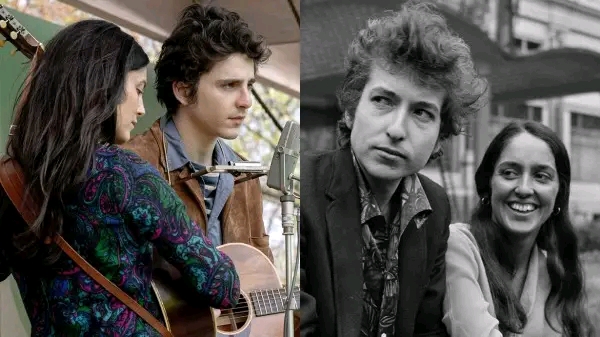
As the much-anticipated Bob Dylan biopic, *A Complete Unknown*, hits theaters, Joan Baez, a legendary figure in the folk music scene and a close contemporary of Dylan during his early years, offers a surprisingly relaxed perspective. Known for her candidness and integrity, Baez’s reaction to Hollywood’s dramatization of her and Dylan’s intertwined history reveals a refreshing attitude toward artistic interpretation versus factual accuracy.
When Baez first learned about the project, her initial instinct might have been to scrutinize every detail, given her intimate knowledge of Dylan’s formative years. After all, she was there—living through the same turbulent, creative, and tumultuous times. Yet, instead of launching into a fact-checking frenzy, Baez chose a surprisingly laissez-faire approach. Her team, prepared to pore over scripts, diaries, and timelines, was quickly waved off by her calm reassurance: “Don’t bother.” Her reasoning? She simply found the film to be “a fun movie,” emphasizing that it was meant to entertain and evoke emotion rather than serve as a documentary.
Now at 84, Baez’s stance underscores a broader philosophy about storytelling in film. She expressed that she isn’t losing sleep over whether she and Dylan truly lived in the Chelsea Hotel at the same time or whether certain events unfolded exactly as depicted. “Details, details,” she chuckled in a recent *Rolling Stone* interview, highlighting her belief that the essence of the story lies in its emotional truth rather than precise chronology.
Baez’s appreciation for the film’s emotional authenticity is evident in her praise for the actors’ performances. She singled out Timothée Chalamet, who portrays Dylan, praising his ability to capture the essence of Dylan’s music, attitude, and charm. “He nailed the music, the bad attitude, and even some of that signature charm,” she remarked. Baez also lauded Monica Barbaro, who embodies her on screen, describing her as working “like mad” to get the part right. She even noted that at times, Barbaro’s resemblance to her was “startling,” adding a touch of humor and admiration.
Of course, no biopic can be entirely true to every detail, and Baez acknowledged this with a humorous anecdote about a famous scene involving her middle finger. Some viewers might have assumed she flipped Dylan the bird, but Baez clarified that it was a peace sign. “Someone asked me, ‘Did you really do that to Bob?’” she recounted. Her response? “No, I did this”—she then flashed the peace sign—highlighting that the scene was more about capturing an attitude or a moment rather than depicting a literal event.
Ultimately, Baez’s attitude underscores a key point: the film aims to portray a larger emotional and cultural truth rather than serve as a documentary. Her focus is on how the movie captures the “wild, beautiful, complicated chapter in music history,” which she believes it does effectively. For her, the film’s value lies in the feelings it evokes—nostalgia, rebellion, love, and the raw energy of those pioneering days in American music—rather than in whether every scene is historically accurate.
Baez’s perspective resonates with many artists and audiences who understand that biopics often blend fact and fiction to serve a narrative purpose. Her openness about the film’s artistic liberties suggests a healthy appreciation for storytelling as an art form—one that can sometimes prioritize emotional truth over strict adherence to facts. Her attitude also reflects her own approach to her legacy: valuing the feelings and messages conveyed through her music more than the minutiae of every event.
In a world increasingly concerned with authenticity and “truth,” Baez’s reaction is a reminder that sometimes, a good story is about capturing the spirit of an era rather than documenting every detail. Her acceptance of the film’s liberties signals her belief that art, in its highest form, should evoke genuine emotion and understanding—qualities that a well-made biopic can deliver, even if it takes some creative liberties along the way.
As *A Complete Unknown* continues to draw audiences and spark conversations, Joan Baez’s laid-back yet perceptive stance offers a refreshing perspective on how we engage with stories about iconic figures like Bob Dylan. It’s a testament to the idea that sometimes, the most important thing a film can do is resonate emotionally—bringing to life the chaos, charm, and complexity of a legendary musical chapter, even if it doesn’t stick rigidly to the facts.
Leave a Reply